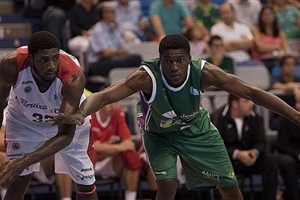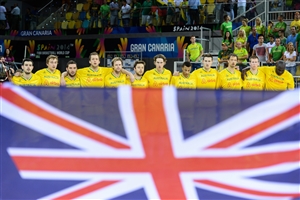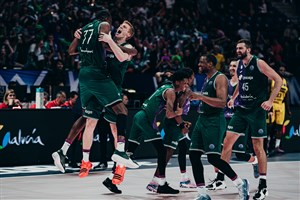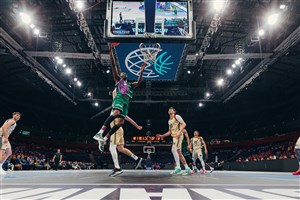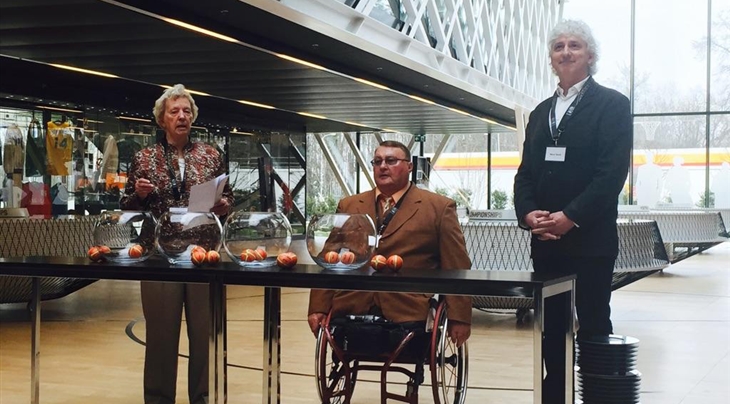
When a house becomes home
Charlotte (Steve Goldberg's Wheel World) - If the experience of two North American members of the International Wheelchair Basketball Federation (IWBF)'s Executive Council are representative, the House of Basketball is truly awe-inspiring and a must see for any basketball fan that has the chance to get there.
I spoke on Thursday with Stephen Bach of Canada and Dick Bryant of the United States who could barely stop gushing about the look, feel, and features of FIBA's headquarters in the Swiss town of Mies, which sits just north of Geneva. They had been there towards the end of March for a meetings and the draw for this summer's Parapan American Games in Toronto, which will be the America's zone qualifier for the Rio 2016 Paralympic Games.
Bach, who is President of Wheelchair Basketball Canada and a Vice-President of the IWBF, told me: "It is just a remarkable building. It was like being a kid in a candy shop. Driving up to the FIBA complex, the way it's branded, from the moment you step on the property you know it's all about basketball.
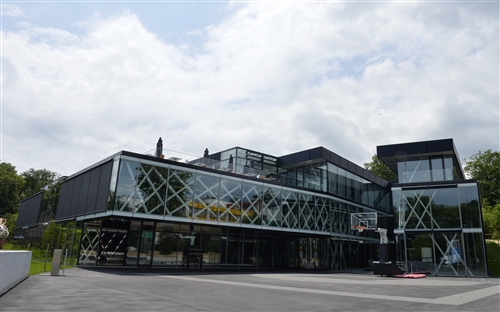
"From the artwork in the gardens to the unique architectural design of the building to the museum they've got on the main floor, the entire building inside and out just speaks basketball."
Dick Bryant, a former NWBA President and currently President of IWBF Americas, lauded its sense of history.
"It was fantastic. The archives are unbelievable, the amount of material they had. A lot of amazing stuff in there that shows how the game has progressed over the last hundred or so years," he said.
"One of the features I especially like in the design is that from the air, the lines of the building give the shape of a hand. In my opinion, that hand is facing up so it’s a lefty like me so I like it even more."
Something even bigger than their visit is what truly has me enthused, a greater collaboration between FIBA and the IWBF. According to Bach as well as to IWBF Secretary General Maureen Orchard, FIBA has offered space and some (if you'll excuse my use of the unintentionally gender-specific term) manpower to help move this evolution forward.
The office of the IWBF will take up residence in the House of Basketball - I call it the HoB - with some administrative and resource support from FIBA. This is both a small and large thing.
Small in the sense that the IWBF is still quite understaffed for all it must do and large in the sense that the economies of scale and expertise in so many areas that FIBA already has are potentially being opened up for it.
"The IWBF has to move itself from the volunteer-based organization that it is to one that demonstrates a greater professionalism and presence in the eye of the public," said Bach. "I think this move sets us in the right direction to start with.
"There are great synergies to be had where we may be able to share in the marketing and communications with FIBA. Being in proximity to those kinds of resources will help us extend our reach in growing the game worldwide."
Bryant pointed out the participation of FIBA Secretary General Patrick Baumann during their time at the HoB and his enthusiasm for bringing the IWBF office to Mies.
"What we've established with FIBA is a great partnership," he said. "They certainly have great respect for wheelchair basketball, the athletes and they've shown that. Their support and the resources that will be available through this partnership will be amazing."
Bryant feels that the move will give the IWBF greater credibility and set a path towards "becoming a viable business."
Bach is frank and self-aware when he says: "We are a relatively immature organization with huge potential and with incredible assets in our world championships and our Paralympic Games that really it's a direction that we have to move in and this is a helping hand in doing that."
In general, Paralympic sports are still far behind on the curve that their Olympic counterparts had to navigate in earnest, beginning in the early 1980s after the successful marketing and revenue generation of the Los Angeles Olympics, from overwhelmingly volunteer-run organizations to professional business structures. As marketing and sponsorship became more integrated and necessary to support their teams, competitions and development, they needed to fund the staffing needed to make it all work. And it had to work on a level that sponsors could entrust their money to.
When it comes to vertical, sport-specific integration or partnerships between the bigger Paralympic and Olympic sports where it is possible, wheelchair basketball is somewhere in the middle of the spectrum with wheelchair tennis being at the top and athletics and swimming below. The partnership is not new, just evolving and growing in a way that embodies FIBA's promise that "We are basketball" is all-inclusive for those shooting at a hoop regardless of whether they are male or female, from one country or another, on a team of five or three, standing or sitting.

An important bridge to the relationship has been Jan Berteling, the long-time President of IWBF Europe who, until recently, was also the treasurer for FIBA Europe for a dozen years. So in that sense, the IWBF has long had a strong advocacy inside the halls of basketball. He gave me a brief history of how it got to this point.
"This meeting was a result or many years of work, by Maureen and by myself. I raised the issue in FIBA for the first time in 1981, inviting the then Secretary General Borislav Stankovic to a friendly tournament in Aalsmeer, Netherlands where the four best teams at the time participated. Since then, (the) IWBF has always had full support of FIBA," said Berteling.
"But the step that was taken last weekend is an enormous change and I expect that we will go much further in the years to come. FIBA is very positive about this step and so are we."
The HoB also took time, first suggested in 1968 but not acted upon for another 30 years until the 1998 FIBA World Congress regenerated the idea which now lives.
"This is a huge step for the IWBF in having a home and that means a lot," said Bryant.
For wheelchair basketball, the House soon becomes that home.
Steve Goldberg
FIBA
FIBA's columnists write on a wide range of topics relating to basketball that are of interest to them. The opinions they express are their own and in no way reflect those of FIBA.
FIBA takes no responsibility and gives no guarantees, warranties or representations, implied or otherwise, for the content or accuracy of the content and opinion expressed in the above article.
To help make this column as inclusive as possible, please send any national or international event information, story suggestions, or comments to wheelworldmail@gmail.com.

